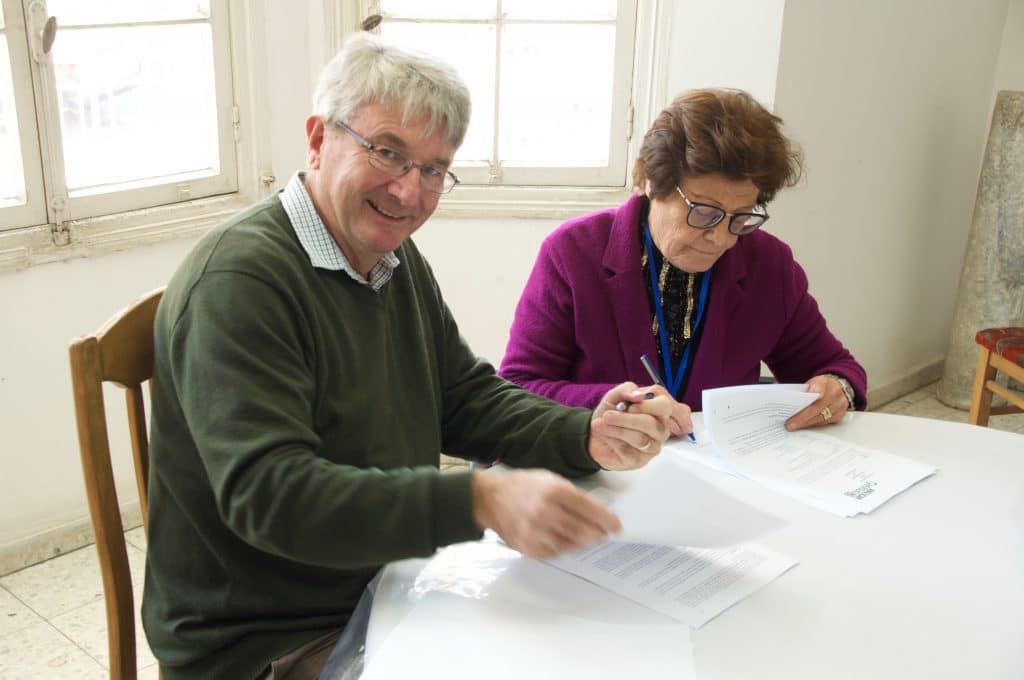Dr Bob Mitchell has called it a day on his time with the Anglican Overseas Aid.

By Chris Shearer
4 November 2021
“CEOs aren’t allowed to have favourites when it comes to programs!” the Reverend Bob Mitchell jokes.
Even if they were, it would be hard for Dr Mitchell to pick one from the many important projects he has been a part of during his years at the helm of Anglican Overseas Aid.
It could have been helping communities develop gender-based violence education programs in Africa, responding to natural disasters in the Pacific, or supporting Ahli Arab Hospital in the Gaza Strip. All the work that AOA has done has shaped and been shaped by Dr Mitchell’s belief in the role churches can play in development programs around the world.
But after nearly a decade in the top job, Dr Mitchell, known as Bob to most, has decided to call time. He will retire as chief executive in February.

“I feel I’ve contributed what I’ve got to contribute,” he told The Melbourne Anglican.
“I had a specific brief at the start about strengthening the relationships with the church and articulating [AOA’s] particular strength as a faith-based organisation. I feel that I’ve done those things, and I feel that I’ve done them well.
“I think it is time for me to step aside and make space for someone else. Ten years is a fair go.”
Bob joined AOA in mid-2012 after a stint as chief of mission for World Vision. There he had often been called on to stand in for then chief executive Reverend Tim Costello when he was unavailable for speaking engagements. So when an interim chief executive role came up at AOA, it seemed like a good fit. The board wanted someone to re-engage the organisation with its church foundations and articulate the “distinctive contribution” that a Christian faith-based organisation could make to development work.
“As a person of faith I’ve always had strong convictions about what faith-based development can add, the unique contribution it can make,” he said.
“I’ve always enjoyed thinking and talking about development work as a ministry of the church.”
Another important draw was Anglican Overseas Aid’s focus on strength-based development. The organisation helps communities understand their assets and strengths, then together they work out how to best leverage these for their development goals. It’s an approach that aims to leave a community better equipped to grow as time goes on, as opposed to one that is driven mainly by outsiders coming into – and eventually leaving – the community.
For Bob, this strength-based approach really connected with his ideology of development work. It didn’t take long before he realised AOA was where he wanted to stay.
It was more than a job for him. It was a vocation.
“When you travel in the field and you see the very basic circumstances in which other people scratch out a living, it’s quite humbling,” he said.
“I’m very conscious of the advantages I have by virtue of just being born in Australia, having a good education and living in a stable environment with steady employment. That’s an amazing blessing. Other people don’t have that.
“So I have a heightened sense of the privilege that is, but also a heightened sense of Christian responsibility that comes with that.”
Since 2012, Bob and his team have built deeper relationships with both their partners around the world and with church development agencies around the country. AOA has also grown a lot more connected to churches, not just in Victoria but around the country. It was recently recommended for reaccreditation with the Department of Foreign Affairs and Trade, a laborious, bureaucratic process that puts all aspects of a development agency under the microscope.

“For a little organisation that is a big achievement because the standards are the same for a small organisation as a big one,” he said.
“It’s just harder to meet them when you’re a small organisation with limited resources.”
Bob said he departed feeling the organisation was in “pretty good shape”, but that there were challenges down the road. Perhaps chief among these was the ageing demographic of the Anglican Church of Australia, and what that meant for the vital support they’ve offered the organisation over the years.
“So a strategic issue is ‘How do we enfranchise another generation of supporters to help this good work into the future?’” Bob said
“I am more convinced than ever of the centrality of doing development work in terms of God’s coming kingdom. I see so many points of resonance between what we’re seeking to do in development programs and the vision we’re given in scripture of the kingdom to come.
“Some of the things we want to see – health, prosperity, people with greater freedoms and dignity and opportunities – are I believe very resonant with what Jesus was on about and the kingdom he promised.”
Not one to look for a quiet retirement, Bob will continue to balance a number of governance roles against passions old and new. He hopes to continue preaching, take up a few creative pursuits, and is looking forward to babysitting his newly arrived grandson.







